Lawsuits
Tricycle operator deemed reckless
It'd be interesting to know what the ruling was in this case, but I haven't been able to find any follow-up articles. The answer is probably hidden somewhere in a court archive.The story reminds me of that more recent case of the aunt who claimed that her 8-year-old nephew's "exuberant hug" broke her wrist, so she sued him for $127,000 in damages. (Yeah, I know, she had to sue for insurance reasons. Perhaps this 1961 case had a similar motive.)
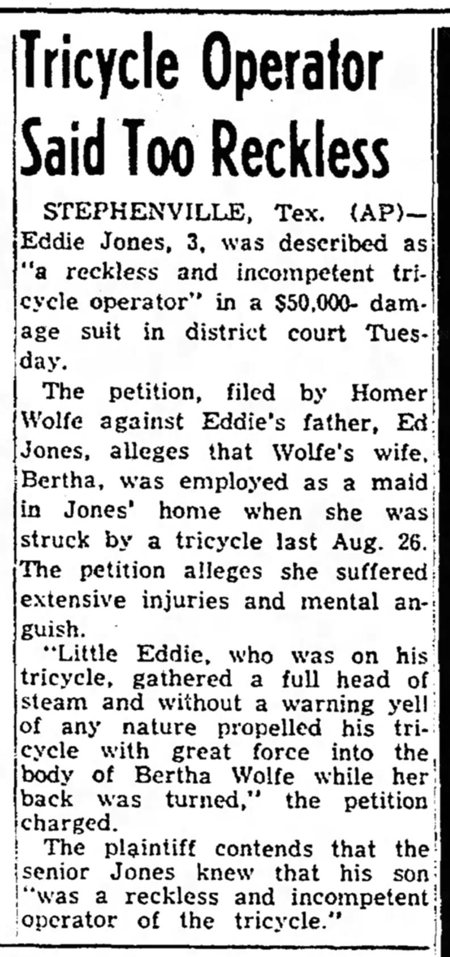
The Daily Capital News (Jefferson City, Missouri) — Jan 27, 1961
STEPHENVILLE, Tex. (AP) — Eddie Jones, 3, was described as "a reckless and incompetent tricycle operator" in a $50,000 damage suit in district court Tuesday.
The petition, filed by Homer Wolfe against Eddie's father, Ed Jones, alleges that Wolfe's wife, Bertha, was employed as a maid in Jones' home when she was struck by a tricycle last Aug. 26. The petition alleges she suffered extensive injuries and mental anguish.
"Little Eddie, who was on his tricycle, gathered a full head of steam and without a warning yell of any nature propelled his tricycle with great force into the body of Bertha Wolfe while her back was turned," the petition charged.
The plaintiff contends that the senior Jones knew that his son "was a reckless and incompetent operator of the tricycle."
Posted By: Alex - Tue Jan 05, 2016 -
Comments (3)
Category: Lawsuits, 1960s
Rice recipe caused nervous breakdown
1992: Bobbie June Griggs sued South Carolina Electric & Gas, claiming that its publication of her rice recipe caused her to suffer a nervous breakdown. Her husband also brought an action for "loss of consortium."Griggs had entered her rice recipe in the utility's Third Annual Rice Cookoff in 1989. She wasn't picked as a finalist, but the utility nevertheless included her recipe in the cookoff cookbook (Rice, a lowcountry tradition: the official cookbook for the Third Annual South Carolina Rice Cookoff). This is what triggered the nervous breakdown.
The state court dismissed her case, noting that it was really a copyright case and thus belonged in the federal courts. In 1995, the state supreme court affirmed this decision (although one justice dissented). And it seems that Griggs tried to take her case all the way to the U.S. Supreme Court, because the AP reported in April 1996 that the Supreme Court also refused to hear her case, noting that "copyright law does not cover infliction of emotional distress" and also that you can't copyright a single recipe.
Her recipe, which she said she spent 10 years developing, involved canned tomatoes, meatballs, onions and bell peppers on a bed of rice. She called it "June's Creation."

Spartanburg Herald-Journal - Apr 23, 1996
Posted By: Alex - Fri Dec 18, 2015 -
Comments (10)
Category: Food, Cookbooks, Lawsuits, 1990s
Swimsuit became transparent when wet
Mrs. Muncy of Redondo Beach was shocked and humiliated when her white swimsuit got wet and showed everything. So she sued the maker of the suit for $10,000.Unfortunately I can't find any record of the outcome of her lawsuit.
That info is probably available somewhere in the archives of the L.A. County Superior Court, but their archives aren't searchable online. It's too bad that courts, for the most part, don't make any effort to put their archives online. It would be a gold mine for the history of weird news if they did.

Freeport Journal Standard - Nov 19, 1953

LA Times - Nov 19, 1953
Posted By: Alex - Sun Dec 13, 2015 -
Comments (9)
Category: Lawsuits, 1950s
Kurvon Breast Enhancement Pills
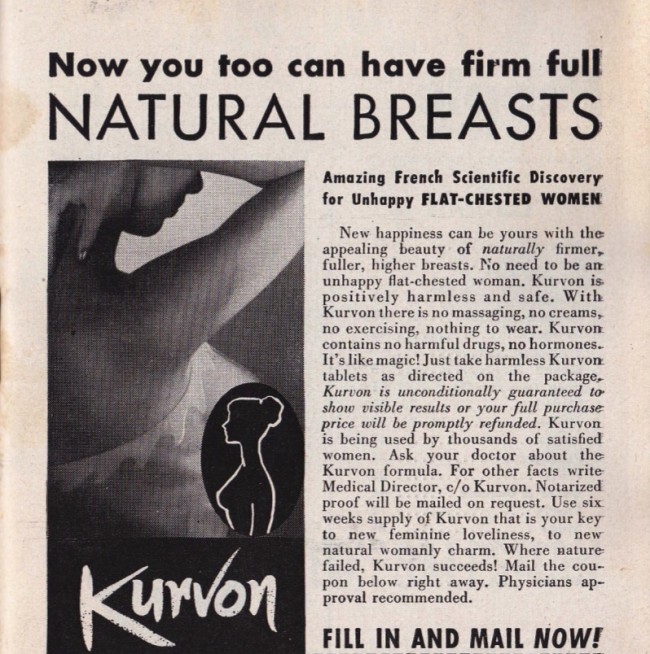
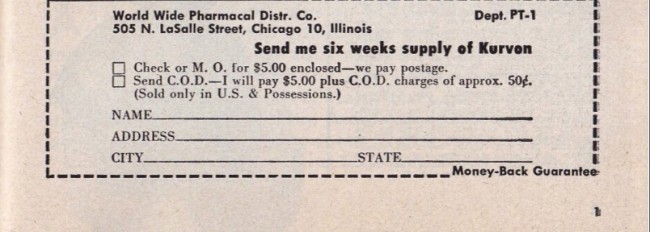
[Click to enlarge--ha!]
There's a great story behind this pill, wherein an ex-employee tried to rip off the formula and sell it as "Charm-on." Read it here.
Did you know breast-boosting pills are still for sale?
Original ad scanned from this magazine:
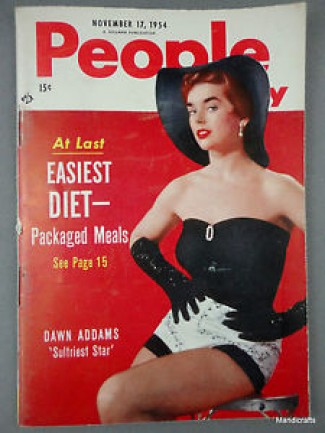
Posted By: Paul - Tue Oct 13, 2015 -
Comments (8)
Category: Body Modifications, Lawsuits, 1950s
Nagging as divorce cause
The 1947 case of DeWaal vs. DeWaal established nagging as legitimate grounds for divorce (in Nebraska). I assume this was before the availability of no-fault divorce. (A quick google search reveals that Nebraska only adopted a no-fault divorce law in 1972.)Note that Mrs. DeWaal argued that her husband was at fault (and not herself) because he went to motion picture theaters and read "sensational magazines."
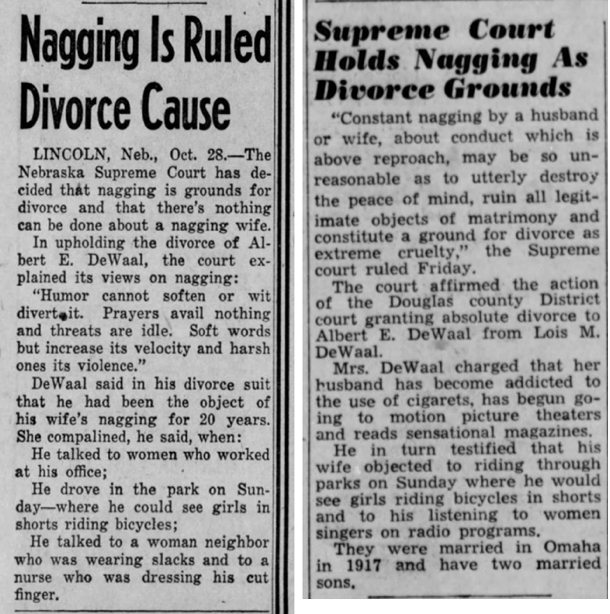
(left) The Harrisburg Evening News - Oct 28, 1947; (right) The Lincoln Star - Oct 24, 1947
Posted By: Alex - Sun Mar 22, 2015 -
Comments (4)
Category: Law, Lawsuits, Husbands, Wives, 1940s
Lionlike snorer sues wall-banger
Classic headline and story from The New York Times - Jan 21, 1964.My favorite line: "Mr. Scheir's snores of gigantic proportions are an animalistic roar, lionlike, that vibrate the rooms. The very anticipation of their beginning at about 2:30 A.M. every day has shaken my client and his wife, deprived them of sleep, injured their health, and, in fact, constitute an assault upon their persons."
The case was subsequently resolved by the construction of a soundproof wall.
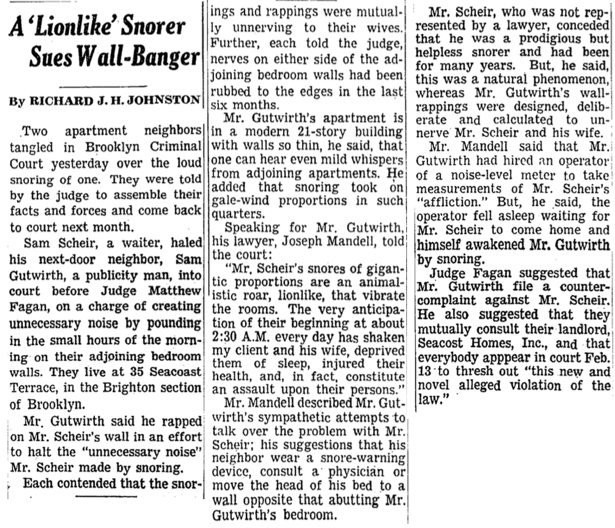
Posted By: Alex - Wed Feb 11, 2015 -
Comments (9)
Category: Noises and Other Public Disturbances of the Peace, Lawsuits, 1960s
Who’s responsible?
Megan Campbell's parked car was hit by a van driven by a city worker, so now she wants the city to pay for the damages. Sounds reasonable. But Campbell was the city worker driving the van that hit her own car. The city is reviewing the incident. [twincities.com]I'm pretty sure Chuck has posted about similar cases in the past. So perhaps this kind of thing is no longer weird?
Posted By: Alex - Thu Oct 09, 2014 -
Comments (8)
Category: Lawsuits, Cars
You got the right one, baby, uh-huh
In the early 1990s, Diet Pepsi ran a series of successful ads that featured Ray Charles and the slogan, "You got the right one, baby, uh-huh."But not everyone liked the ads. Arthur Takeall claimed that Pepsi stole the slogan from him, saying he had used it in his ventriloquism act for years. He would choose an attractive woman in the audience and say, "You've Got The Right One" and his puppet would then say "Uh-huh."
Takeall sued Pepsi for $130 million, but his case was dismissed by the judge. However, in 1997 the Patent and Trademark Office ruled in his favor, deciding that he was entitled to the rights to the slogan, "You got the right one, baby, uh-huh." But as far as I know, it was a bit of a hollow victory since Pepsi never paid him any money.
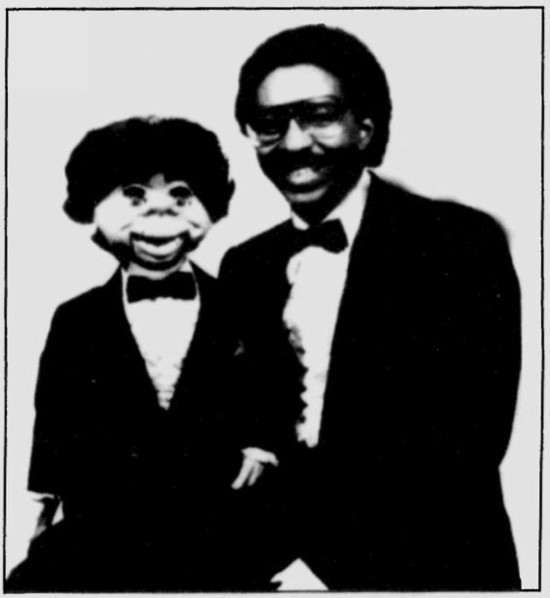
Arthur Takeall and his puppet, Scooter
More about Takeall in the Baltimore Afro-American - May 3, 1997.
Posted By: Alex - Fri Aug 15, 2014 -
Comments (6)
Category: Lawsuits, 1990s
Who owns the selfie?
1) Some monkey took a 'selfie' with a professional photographer's equipment.2) Wikipedia used the image.
3) The photographer claimed copyright & brought a £10,000 suit.
Where do you stand on this? Who has the rights to the image?

Posted By: Expat47 - Thu Aug 07, 2014 -
Comments (12)
Category: Animals, Photography and Photographers, Lawsuits
Suicide Payoff
If you jump in front of a train, is it the train driver's fault if he doesn't stop in time to run you over? Maybe. Back in 1977, Milo Stephens tried to commit suicide in this way and later sued the New York City Transit Authority for running him over. The TA gave him a settlement payment of $650,000 rather than going to trial.A Time magazine article (Jan 9, 1984) explains why the TA opted for the settlement rather than fighting it:
Posted By: Alex - Mon Aug 04, 2014 -
Comments (11)
Category: Lawsuits, Suicide, 1970s

| Who We Are |
|---|
| Alex Boese Alex is the creator and curator of the Museum of Hoaxes. He's also the author of various weird, non-fiction, science-themed books such as Elephants on Acid and Psychedelic Apes. Paul Di Filippo Paul has been paid to put weird ideas into fictional form for over thirty years, in his career as a noted science fiction writer. He has recently begun blogging on many curious topics with three fellow writers at The Inferior 4+1. Contact Us |





